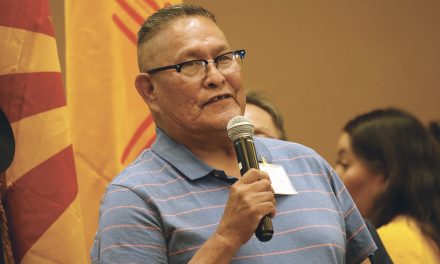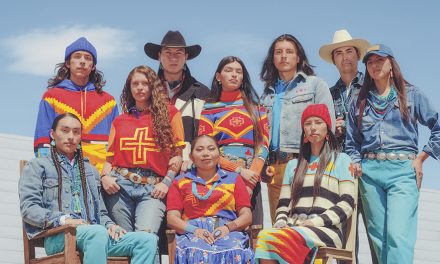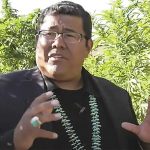
Nygren asks state child welfare experts to adopt traditional Navajo teachings
WINDOW ROCK – Child welfare services provided to by Arizona, New Mexico and Utah may soon be improved through the adoption of traditional Navajo teachings and knowledge if incorporated into their programs.
Officials with these states’ child welfare agencies were in Window Rock recently to discuss ways to expand the capacity of their existing partnership with the Navajo Nation.
The meeting sought ways to strengthen agreements between the Navajo Nation Division of Social Services and states to enhance services for Navajo children and families.
“My administration wants to encourage collaboration between child welfare agencies and to use the Diné Action Plan to help combat the challenges our Diné families and children face,” President Buu Nygren told state officials.
The Diné Action Plan is considered a living document that expresses Diné teachings. It was adopted by the 24th Navajo Nation Council in 2021. The plan was introduced in April 2018 as a blueprint to improve the quality of life throughout the Navajo Nation.
“Unfortunately, we are seeing inter-generational cycles that occur when a child is removed from his or her home,” said Thomas Cody, executive director of the Navajo Division of Social Services. “The increase of substance use, decrease of healthy parenting, and a decrease in teachings at home causes a decrease in spiritual connection.”
According to Cody, some Navajo services aid and provide services that focus on alleviating those generational challenges and traumas.
“Unfortunately, more is needed to combat these issues. This is why these collaborative partnerships are so important,” Cody said.
Although the Nation has the resources to treat those in need, it needed a plan to reflect Navajo values and principles of ntsáhákees (thinking), nahat’á, (planning), iiná (action) and sih hasin (reflection) that Navajos are familiar with through their traditional teaching.
The DAP was the result. It was designed to address public safety, violence, substance use disorder, suicide and missing and murdered Diné relatives on the Navajo Nation, said Cody.
According to the DAP, which references traditional Navajo teachings, in contemporary society Navajos face the “monsters” of the modern world.
“These include substance abuse, suicide and the various forms of violence that has come onto our people. With substance abuse, our people are attacked by the monster of addiction and lose their lives to chemicals that draw them into a trap of irresistible cravings where they are poisoned and die.
“With suicide, our Diné face the evil of hopelessness which results in the taking of one’s own life,” Cody said. “With violence, there are monsters of frustration and pain causing them to lash out on others. Finally, there are monsters outside Navajoland and within (which) take our people away from our families.”
The DAP states that the teachings of the Navajo deities, known to Navajos as the Holy People, “are embedded in our culture and traditions and the teachings provide us with the tools we need to defeat our modern monsters. The teachings have been given to us by our Diyin Dine’é (the Holy People).”
According to Navajo teachings, the seven monsters that have preyed upon the Navajo people from time immemorial are laziness, sleepiness, jealousy, hunger, poverty, lice and old age.
The DAP was established to maintain spiritual connection as the foundational component to self-identify and to our culture, said the president.
Nygren said the Diné Action Plan should be part of each state’s mental health programs because most Navajos would be familiar and comfortable with its concepts, and that would lead to better outcomes.
He said there is a need for a state-tribal cooperative approach because so many Navajos live off the Navajo Nation and use mental health care provided through neighboring state services.
“Mental health and wellness are so important, especially for our young people and elders,” he said. “By working together with our state partners, we can help ensure Navajos have access to culturally appropriate services no matter where they live.”
The COVID-19 pandemic highlighted longstanding mental health challenges on the Navajo Nation. These include high rates of depression, substance abuse and suicide.
Isolation during lockdowns exacerbated these issues for many Navajos.
The agreements will aim to address barriers of lack of transportation, shortage of Navajo-speaking providers, and the high cost of care.
Specific programs being discussed include the development of a mobile crisis unit, school-based telehealth services and funding for traditional healing.








 Highway 264,
Highway 264, I-40, WB @ Winslow
I-40, WB @ Winslow